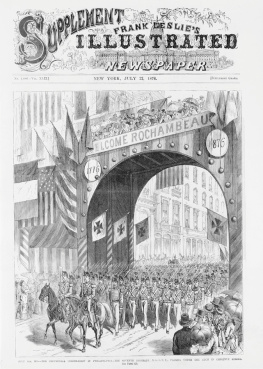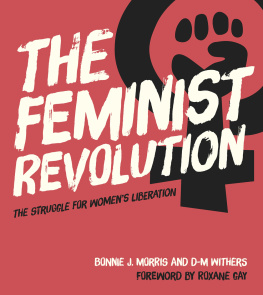Library of Congress Cataloging-in-Publication Data
Names: Westkaemper, Emily, 1979 author.
Title: Selling womens history : packaging feminism in twentieth-century American popular culture / Emily Westkaemper.
Description: New Brunswick, New Jersey : Rutgers University Press, 2017. | Includes bibliographical references and index.
Identifiers: LCCN 2016015514| ISBN 9780813576336 (hardback) | ISBN 9780813576329 (pbk.) | ISBN 9780813576343 (e-book (epub)) | ISBN 9780813576350 (Web PDF)
Subjects: LCSH: Women in popular cultureUnited StatesHistory. | History in popular cultureUnited StatesHistory. | Women in advertisingUnited StatesHistory. | History in advertisingUnited StatesHistory. | WomenUnited StatesHistory. | FeminismUnited StatesHistory. | BISAC: SOCIAL SCIENCE / Womens Studies. | ART / Popular Culture. | SOCIAL SCIENCE / Popular Culture. | DESIGN / Graphic Arts / Advertising. | HISTORY / United States / General.
Classification: LCC HQ1410.W47 2017 | DDC 305.420973dc23
LC record available at https://lccn.loc.gov/2016015514
A British Cataloging-in-Publication record for this book is available from the British Library.
Copyright 2017 by Emily Westkaemper
All rights reserved
No part of this book may be reproduced or utilized in any form or by any means, electronic or mechanical, or by any information storage and retrieval system, without written permission from the publisher. Please contact Rutgers University Press, 106 Somerset Street, New Brunswick, NJ 08901. The only exception to this prohibition is fair use as defined by U.S. copyright law.
Visit our website: http://rutgerspress.rutgers.edu
Manufactured in the United States of America
I received generous financial support for archival research from the Smithsonian Institution, the Hagley Museum and Library, the Radcliffe Institute for Advanced Study at Harvard Schlesinger Library, Smith College, the University of Wyoming American Heritage Center, Franklin & Marshall College, and an Andrew W. Mellon Foundation Fellowship at the Library Company of Philadelphia and the Historical Society of Pennsylvania. Rutgers University and its history department provided funding during my graduate study. James Madison University (JMU) provided vital assistance through an Edna T. Shaeffer Humanist Award, a College of Arts and Letters Faculty Summer Research Grant, a Madison Caucus for Gender Equality Professional Development Fund Grant, and history department research funds. I would also like to thank Gabrielle Lanier, Michael Galgano, David Jeffrey, and my colleagues and students for making JMU a wonderful place to work as a historian.
Many archivists and curators assisted my research. Thank you to Marianne Hansen and Eric Pumroy for providing access to the unprocessed Philadelphia Club of Advertising Women records at the Bryn Mawr College Library. At the Smithsonians National Museum of American History, Larry Bird, Fath Davis Ruffins, and Susan Strange offered useful insight. Larry generously shared his Cavalcade of America research materials. At Schlesinger Library, Ellen Shea made fruitful recommendations. Paula Weddle and the JMU interlibrary loan staff provided important assistance.
I appreciate feedback on portions of this work presented at the JMU History Forum; the JMU Center for Faculty Innovation; the 2013 American Historical Association Annual Meeting; the 2008 Berkshire Conference; the 2007 American Studies Association Annual Meeting; and the 2007 Graduate Symposium on Womens and Gender History at the University of Illinois, Urbana-Champaign. Participants in Bonnie Smiths research seminar at Rutgers helped me define this project. Pete Daniel, David Gilbert, Ann D. Gordon, Elizabeth Hageman, Allen Howard, Alison Isenberg, Temma Kaplan, Abigail Lewis, Sandra Mendiola Garcia, Jennifer Miller, and Melissa Stein improved my research and writing. I am also grateful to Anne Boylan for sharing her seminar paper on radio and her research on Miriam Holden. My JMU student Jessica Davis located the Saturday Evening Post article Are Women Doing Their Share in the War?
I first examined popular cultures use of the past for an undergraduate thesis directed by Grace Hale, whose insight set the path for my subsequent research. Cindy Aron, Alon Confino, Alan B. Howard, Elisabeth Ladenson, Michael Levenson, and Franny Nudelman also provided inspiration at that early stage.
Nancy Hewitt, Jackson Lears, Bonnie Smith, and Jennifer Scanlon provided expert guidance on my dissertation. I am also indebted to Nancy Hewitt for her advice and encouragement on its revision into this book.
I am deeply grateful for the editorial work of Kimberly Guinta, Carrie Hudak, Katie Keeran, and Leslie Mitchner at Rutgers University Press and for the feedback of three anonymous readers. I also thank copyeditor Romaine Perin and all the Rutgers University Press staff who have assisted with this publication.
Throughout my research and writing, I drew support from family members: Timothy Westkaemper, Richard Benedict Westkaemper, Sunya Olson Westkaemper, and Richard Barwise Westkaemper. The memory of Margaret Paradise Hogan is one of the reasons I pursued womens history. I benefited from Sarah Henrys invaluable friendship throughout the entire process. Aric Berg gave bountiful inspiration.
My mother, Kathleen Hogan Westkaemper, has sustained me in countless ways, which I am grateful to acknowledge with thanks and love.




